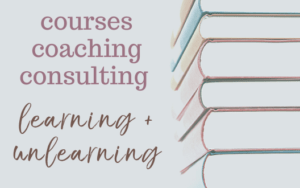Sometimes serendipity and unexpected connections make for excellent contemplative writing moments. To close this series of posts on contemplative writing (for now—more posts are sure to come in 2022), I want to share another guided meditation: a walking meditation for writers.
I was presented with the unexpected opportunity to record this meditation during a recent writing retreat. A participant asked for guided meditation during a mid-day walk. I love walking and walking meditations! So, this impromptu recording emerged.
This 21-minute meditation is emergent—moving through embodied awarenesses, affirmations, and reflection questions: all aimed at supporting writers and re-invigorating writing motivation. It’s for writers working on any genre of writing, at any stage of the process. I hope that it cultivates curiosity and courage.
Download the accompanying transcript of this guided meditation here.
Though the guided meditation doesn’t presume any particular type or pace of walking, it does tap into the embodied experience of walking, which isn’t always accessible. For meditations that can be done in stillness, check out this 14-minute practice or this 23-minute one.
Why Walking Meditation?
Because writing is an inherently creative activity, it pairs well with other creative modalities. As a writing teacher, I’ve found that sometimes entering the writing activity through another creative avenue—like drawing or painting or dancing or, in this case, walking—can help us experience the writing process anew, with curiosity through a different way in.
My experience with walking meditation began, truly, as a young person spending hours playing outdoors in the Appalachian Mountains, where I learned how much I love hiking. It became an experiential practice in early adulthood, when I identified that I need time on trails to ground myself (yes, I’m a Taurus, an earth sign :-)). And it formalized through practicing Buddhist teacher and activist Thich Nhat Hanh’s walking meditations.
Today, I trace my influences to Thich Nhat Hanh’s How to Walk. (I love this series of short books, including How to Fight, as well as this walking meditation poem, also by Thich Nhat Hanh.)
But my interest in walking meditations goes deeper, still. I’m interested in how taking steps—one step and then another, literally or metaphorically—can serve as a guiding principle for living out commitments to justice.
As I’ve written previously in “Self-Inquiry and Social Justice: What’s Walking Got to Do with It?”:
As evidenced in Martin Luther King, Jr.’s oft-cited quote about ‘taking the first step,’ Sarah Ahmed’s analysis of pathways, and Beverly Daniel Tatum’s visualization of moving walkways, the imagery of walking factors large in social justice discourse, providing lessons about the importance of consistent, counter-normative work for the long haul.
Whether or not you can or choose to engage in any physical or literal walking, the metaphor highlights the importance of small steps toward learning how to live differently, how to tread alternative paths. And efforts to reflect on ourselves, our collective responsibilities, and our response-abilities are needed now and needed regularly.”
So, for me, the question of “why walking meditations?” points to the deep motivations, dedications, and commitments for writing and living. Like contemplative writing and contemplative practices more broadly, walking meditations can reduce harm by disrupting auto-pilot and the status quo. This is especially the case when we practice self-inquiry, making it habitual.
Self-Inquiry Journal Questions: As Writers, What Are We Practicing?
As I have done with the other posts in this series on contemplative writing, I end with questions you might consider when journaling. I hope the pairing of a walking meditation with journal prompts reinforces the idea that contemplative writing is both/and: both contemplative practices that support writing (like guided meditations and grounding for writers) and writing practices that support contemplation (like learning logs and reflective writing).
Again, these are questions I keep asking myself and questions you could write in response to or consider while walking—in whatever form that might take. These are questions about what we’re truly practicing as writers, with and in our writing. These are questions about what we’re committed to practicing, because in the words of writer and organizer Mia Mingus: “Always reflect on what you are practicing because you are always practicing something.”
If you practiced a guided meditation (the walking meditation or another), you might ask:
- What did I notice about the experience?
- What affirmations feel important to take beyond the meditation?
- What are my physical sensations or emotions alerting me to or asking me to notice?
- What am I learning about myself as a writer?
- What am I learning about how I currently show up for writing and, in contrast, how I desire or long to show up?
- Are there any writing practices that I’m feeling called toward or ready to commit to?
If you’re called to learn more about or to practice contemplative writing, you might ask:
- What does the calling feel like?
- How do I experience this interest or curiosity in contemplative writing?
- When and where am I already practicing contemplative writing?
- When and where would I like to practice contemplative writing more regularly or with more intentionality?
- How could I act on a calling to contemplative writing, transforming desire into habit-forming practice?
—
This post is written by Beth Godbee, Ph.D. for Heart-Head-Hands.com. It’s the third post in a series on contemplative writing.
If you’d like to connect around reflection and writing, check out upcoming writing retreat days, recharge and recommit gatherings, one-with-one coaching, and subscription options. For regular updates, sign up for the email newsletter. Thanks!




Leave a Reply